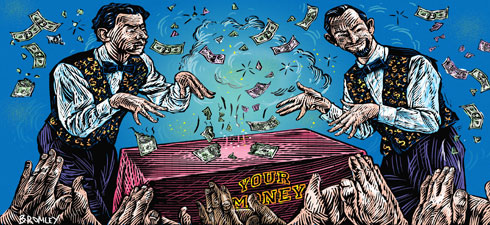Prior to the economic crisis, Olafur Hauksson was police commissioner in Akranes, a small port town of 6,500 inhabitants stranded at the end of a frozen peninsula some fifty kilometres from Reykjavik. Since 2009, he tracks down and brings to justice those who played a role in the country's economic collapse of 2008.
At the end of 2008, the Icelandic bubble burst as a consequence of the subprime crisis in the United States. Two weeks after the dramatic fall of Lehman Brothers, the country's three major banks – valued at 923% of gross domestic product (GDP) – collapsed. The crisis swept through the island, the Icelandic krona dropped in value and no intervention could halt its downward spiral. On October 6, 2008, live on national television, the then-prime minister ended his speech by asking God to "save the island".
Since that fateful day, Iceland has known troubled times. In 2009, the Icelanders, although not used to demonstrating over social issues, shouted their anger against the politicians and the "neo-Vikings" of finance that betrayed them. The "revolution of pots and pans" forced the resignations of the Parliament and of the conservative government.
One of the demands of that movement was that those that profited from the economic situation and who pushed Iceland into the economic abyss be brought to justice. Early legislative elections [in 2009] brought the left to power. The new prime minister, Johanna Sigurdardottir, wanted to quickly appoint a special prosecutor to investigate the causes of the crisis but candidates applying for the post were hard to find.
Olafur Hauksson, isolated in his little provincial police station, had the merit of having no relations with the elite accused of having hastened the island towards bankruptcy. Despite his total inexperience concerning matters of economic law, he was the only one to apply for the job. More than three years after his appointment, he recognises himself "only recently feeling at ease in his function". Starting out with a team of five, he now manages over one hundred assistants.
Relocating abroad
Theirs is a double burden: "On one hand, we have to investigate all suspicion of fraud and offences committed before 2009, on the other hand, we bring the lawsuits against the suspects to court ourselves," Hauksson explains. This is a "totally new" method which allows the investigators to "follow the case" and the judicial system to "know the cases like the back of their hand". This is indispensable in order "to compete with the well-prepared defence attorneys".
To ease the prosecutor's job, the government modified the laws on banking secrecy. "Today, we have access to all information with no objections possible," claims Olafur Hauksson. Suspected bank fraud, swindles, professional identity theft, misuse of funds, the types of investigations are wide-ranging and the three – soon to be four – interview rooms are never empty. The prosecutor says he is currently working on "a hundred priority cases".
Most of those targeted are former banking sector officials or were board members of banks before the crisis. These Icelanders have often opted to relocate abroad – to Luxembourg, for example – to further their careers. A dispersal that complicates the task of Hauksson's team. Yet searches continue and the team pursues its investigations abroad in the foreign subsidiaries of the Icelandic banks and includes questioning foreigners. "We enjoy full international cooperation," stresses Olafur Hauksson.
To date, some convictions have been achieved. Two former officials of the Byr bank, the first to be brought to trial, are now serving prison sentences of four and a half years. The former chief of staff to the finance minister at the time of the crisis, Baldur Gudlaugsson, was sentenced to two years in jail for insider trading. More recently, Sigurdur Einarsson, former CEO of the Baupthing Bank was sentenced to reimburse the bank 500 million Icelandic kronur – 3.2 million euros – and had his assets frozen.
“Purge” will not take immediate effect
Others are awaiting their day in court. Jon Thorsteinn Oddleifsson, former head of treasury at the Landsbanki, should soon discover his fate, as should Làrus Welding chief executive of the Glitnir Bank.
Olafur Hauksson's work raises vivid criticism from the population. "We know that all eyes are on us, that we must not fail," he says, but "to hasten the process would inevitably lead to errors and, given the current context, with so much mistrust towards institutions on the part of Icelanders, we must, more than ever, be above reproach."
It is difficult to be "above reproach" in a society where questionable practices were standard for a long time. In May, two members of the prosecutor's team sold information for 30 million Icelandic kronur – 191,000 euros – to a mysterious recipient. The two former police officers were investigating the Sjovar/Milestone case, concerning an insurance company in which the Icelandic Central Bank invested before yielding its shares at a loss. Accused of breaching the confidentiality of their function, the two men were suspended and placed on retirement.
The "purge" of the Icelandic financial system, as Olafur Hauksson likes to call it, will not take immediate effect. While aiming to end his mission in 2015, the special prosecutor mainly hopes that Iceland, whose economy has slowly revived, will one day "look back and be proud to have drawn the lessons of the past".
Do you like our work?
Help multilingual European journalism to thrive, without ads or paywalls. Your one-off or regular support will keep our newsroom independent. Thank you!












